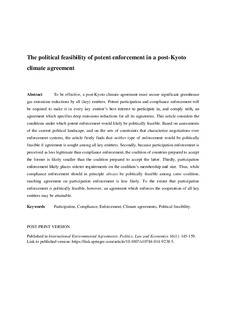The political feasibility of potent enforcement in a post-Kyoto climate agreement
Journal article, Peer reviewed
Accepted version

Permanent lenke
http://hdl.handle.net/11250/2466151Utgivelsesdato
2014Metadata
Vis full innførselSamlinger
- Journal articles [478]
Originalversjon
International Environmental Agreements: Politics, Law and Economics. 2014, 16 (1), 145-159. 10.1007/s10784-014-9238-5Sammendrag
To be effective, a post-Kyoto climate agreement must secure significant greenhouse gas emissions reductions by all (key) emitters. Potent participation and compliance enforcement will be required to make it in every key emitter’s best interest to participate in, and comply with, an agreement which specifies deep emissions reductions for all its signatories. This article considers the conditions under which potent enforcement would likely be politically feasible. Based on assessments of the current political landscape, and on the sets of constraints that characterize negotiations over enforcement systems, the article firstly finds that neither type of enforcement would be politically feasible if agreement is sought among all key emitters. Secondly, because participation enforcement is perceived as less legitimate than compliance enforcement, the coalition of countries prepared to accept the former is likely smaller than the coalition prepared to accept the latter. Thirdly, participation enforcement likely places stricter requirements on the coalition’s membership and size. Thus, while compliance enforcement should in principle always be politically feasible among some coalition, reaching agreement on participation enforcement is less likely. To the extent that participation enforcement is politically feasible, however, an agreement which enforces the cooperation of all key emitters may be attainable.
Beskrivelse
This is an accepted manuscript of an article published by Springer.